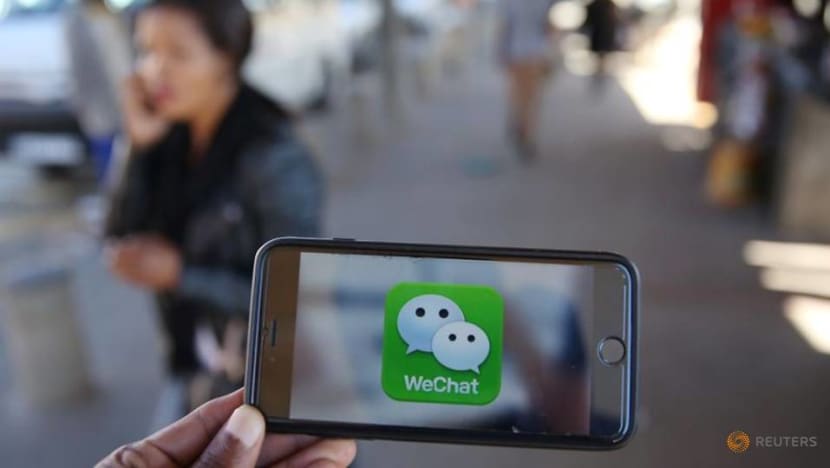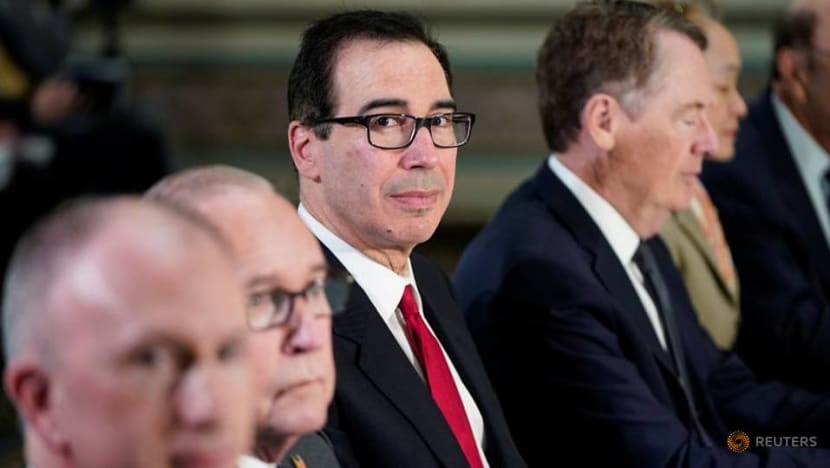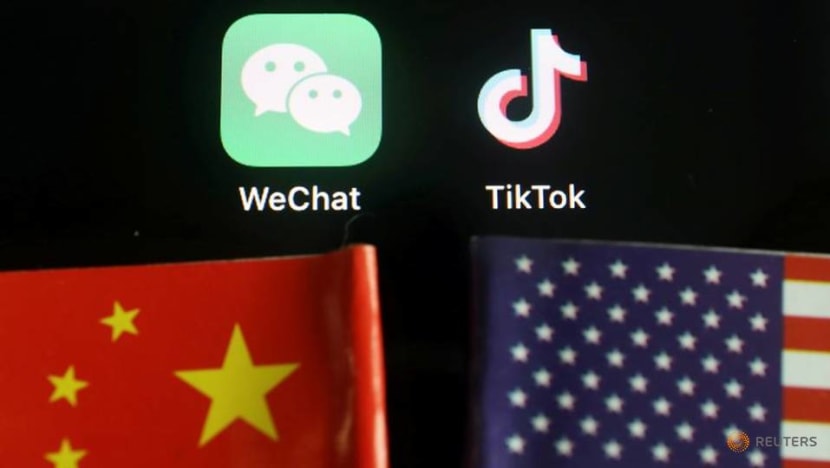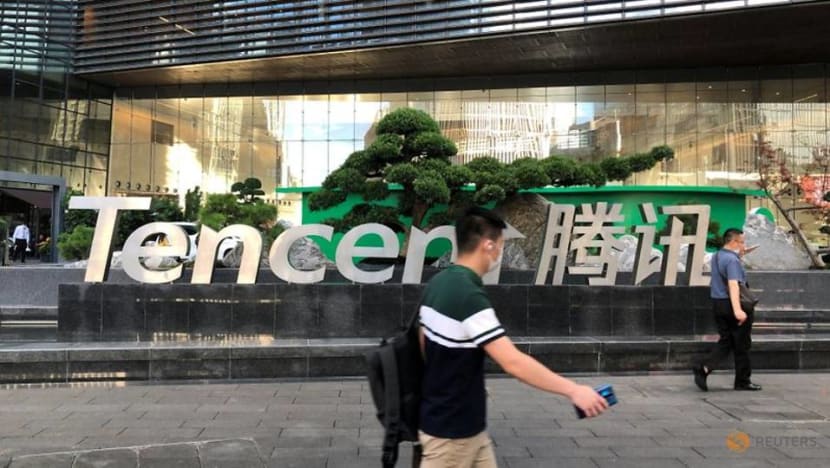commentary Commentary
Commentary: WeChat ban a formidable weapon in US-China trade war
The hawks in Donald Trump’s administration are on the ascent. Do not expect the US to u-turn on this march towards a harsher stance on China, say Steven R Okun and James Green.

A WeChat logo is displayed on a mobile phone as a woman walks past as she talks on her mobile phone at a taxi rank in this picture taken on Jul 21, 2016. (Photo: REUTERS/Siphiwe Sibeko)
SINGAPORE: Last week’s suite of actions by the United States against WeChat and TikTok were among the most significant developments since March 2018 when US President Donald took formal action in retaliation for China’s unfair trade practices.
Not since the US government’s decision to block Singapore-based Broadcom’s attempt to acquire Qualcomm on national security grounds then could the US-China trade war directly impact companies based in the region.
In particular, potential action prohibiting doing business with WeChat could impact how regional businesses operate in the region.
WeChat plays a big a role in daily communications, IT services and beyond in doing business in and with China. All sorts of activities between Chinese and foreign companies, and intra-company communications between a foreign company and Chinese offices of those companies, ends up on WeChat.
LISTEN: Unfair firing and hiring practices under scrutiny during Singapore’s worst recession
READ: Commentary: Is national security a good reason to ban TikTok?
Much remains unknown regarding to what extent doing business utilising WeChat will be prohibited and to whom the ban will apply.
But the implications and drivers of this latest saga seem clear.
THE CHINA HAWKS ARE WINNING
Two distinct camps have always co-existed within the Trump administration when it comes to China: The globalists and the China hawks.
The globalists, typified by Treasury Secretary Steve Mnuchin and Director of the National Economic Council Larry Kudlow, argue that the US and China live in a global economy and that negotiated trade deals between the two countries benefit the United States.

The China hawks, led by Secretary of State Mike Pompeo and White House Director Trade and Manufacturing Policy Peter Navarro, believe advancing the US public interest requires confronting and decoupling from China.
Until now, President Trump maintained something of an equilibrium between these two factions. While he sympathised with the hawks, he believed his best path to re-election was a strong economy and that would be best achieved through trade deals with China.
However, with record unemployment and US economic growth plummeting, Trump’s re-election chances no longer rest on his economic record. The hawks are ascendant and driving US policy towards China.
THE US-CHINA RIVALRY HEATS UP
Over a span of four speeches the past two months, the Trump administration delivered a harsh message of a once-in-a-generation life-or-death ideological struggle between the US and China. Such rhetoric advance a very different narrative set forth by previous administrations.
National Security Advisor Robert O’Brien began the rollout explicitly warning of the threat the Chinese Communist Party (CCP) poses “to our very way of life” at the Arizona Commerce Authority on Jun 24.
READ: Commentary: Big Tech is showing some love to the US government – which comes as no surprise
READ: Commentary: Help, I love tech monopolies!
Next, FBI Director Christopher Wray described the CCP’s active espionage efforts in the United States a threat to “our health, our livelihoods, and our security” at a Hudson Institute event on Jul 7.
Attorney-General William Barr furthered the administration’s case and specifically called out US companies for sharing technology with Chinese partners and genuflecting to Beijing’s censors and policy demands on Jul 17 at the Gerald R Ford Presidential Museum in Michigan.
In what is now seen as a major policy speech, Secretary of State Mike Pompeo at the Richard Nixon Presidential Library in California on Jul 24, argued the CCP is driven to world domination, and the United States and its allies must stand up to this global menace.
Consistent with the overall framework outlined by the four prominent Cabinet officials, the Trump administration rolled out a series of announcements and policies aimed at China.
Earlier moves over the last month include the sudden closure of the Chinese consulate in Houston, sanctions on Chinese companies and officials for activities in Xinjiang, and a declaration that Chinese claims in the South China Sea are “completely unlawful”.
WHAT THE WECHAT BAN ENTAILS
One of the most high profile of the new policies is the White House Executive Order (EO) against WeChat.

The EO holds that what WeChat collects from its users “threatens to allow the Chinese Communist Party access to Americans’ personal and proprietary information. In addition, the application captures the personal and proprietary information of Chinese nationals visiting the United States, thereby allowing the Chinese Communist Party a mechanism for keeping tabs on Chinese citizens who may be enjoying the benefits of a free society for the first time in their lives.”
Using authority from the sweeping International Emergency Economic Powers Act (IEEPA), the EO instructs the Secretary of Commerce to review all US interaction with the social media platform to make a detailed determination in 45 days about prohibited transactions.
The EO could ban the Chinese app from US platforms, including the Android and Apple operating systems.
Based on US precedence, any ban could apply to US persons and companies. We also do not yet know if it will cover any business related to a US company or just a subset of one.
READ: Commentary: India’s legion of TikTok users are collateral damage in Chinese app ban
READ: Commentary: The US-China tech rivalry is fracturing the world and affecting trade, firms and jobs
Something much less may come out after the one-and-a-half-month review. Unlike the carefully drafted and administered tariffs imposed for Chinese forced-technology transfer policies, the WeChat order is poorly written and leave open the possibility of a court challenge.
For example, the EO prohibits "any transaction that is related to WeChat by any person, or with respect to any property, subject to the jurisdiction of the United States, with Tencent Holdings".
But what counts as a covered "transaction"? Exchanging messages with another WeChat user? Reading an article from a Chinese entity posted on its official WeChat account? Paying for a product or service using WeChat Pay?
Further, WeChat parent company Tencent has a research office in Silicon Valley and a track record of paying significant sums for US content - US$1.5 billion to broadcast NBA games in China, for example. That would likely give the company a hefty financial incentive to challenge a blanket ban which could delay any implementation.

While the courts have generally deferred to the US executive branch on issues of national security, the claim there is an “economic emergency” is expansive and may go beyond the 1977 IEEPA statute, originally enacted in post-Watergate reforms to limit presidential power.
POLITICS LINES UP WITH POLICY
Nothing this major happens at this time of a presidential campaign without politics being a major factor.
Trump’s governing actions have always been driven by whether they will help him get re-elected.
Now, with just over two months till Election Day, getting even tougher on China, even if it means walking away from the Phase I trade deal commitments to purchase US goods, drives Trump’s decision making.
Nothing recently has changed with regard to the national security concerns which would warrant a shift in position.
What has changed are Trump’s re-election chances. The administration may be more interested in generating news coverage of the China threat before the November election than in taking the time to construct a careful legal position that would withstand challenge in court.
READ: Commentary: Could Donald Trump not run for re-election?
READ: Commentary: Kamala Harris brings several credentials as potential US vice-president
The Chinese government will try to come up with actions to take against US government officials and companies that create some appearance of balance. That said, as a general matter, the Chinese government does not want to scare away American investment or companies from the domestic market, which is much more reliant on foreign participation than the US economy.
There is a general consensus inside many parts of the US bureaucracy – and not just among Trump political appointees - that Chinese government behaviour at home and abroad must be addressed through sanctions and naming-and-shaming.
The politics and the bureaucratics mean more actions are on the way, no matter who wins in November.
The EO needs to be written much more clearly as well as being executive on a firm legal basis. But do not expect the US to change its position because of anything China might contend in upcoming trade talks between the two countries.
For now, there are more questions than answers. But given the trajectory of the US-China relationship and the urgency of the campaign, come Sep 20 those covered by the order may have to be prepared to delete their WeChat accounts.
Steven R Okun and James Green, based in Singapore and California, respectively, serve as Senior Advisors to US-headquartered geostrategic consultancy McLarty Associates. Mr Okun served in the Clinton administration as Deputy General Counsel at the US Department of Transportation and Mr Green as Minister Counselor for Trade Affairs at the US Embassy in Beijing during the Obama and Trump administrations.

















